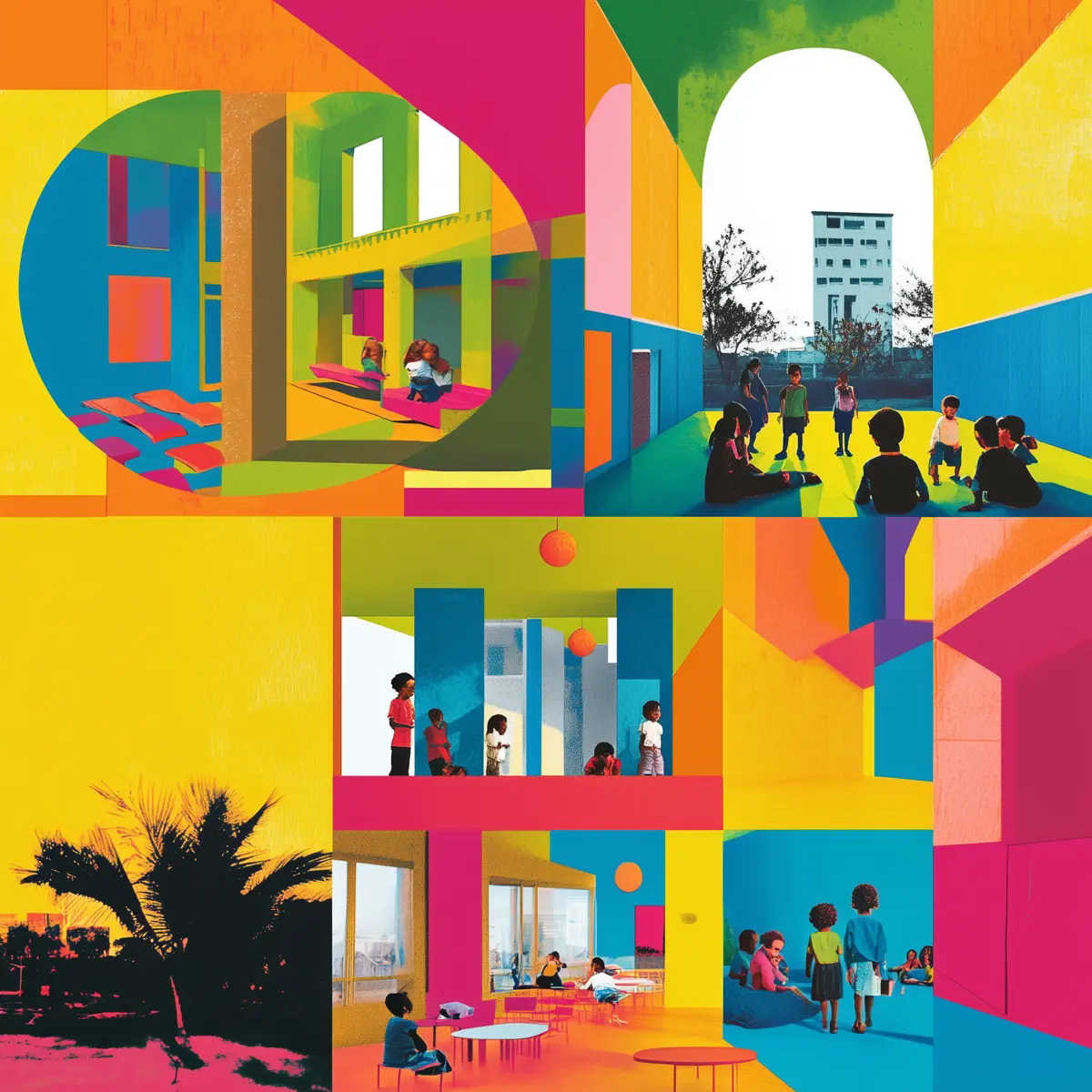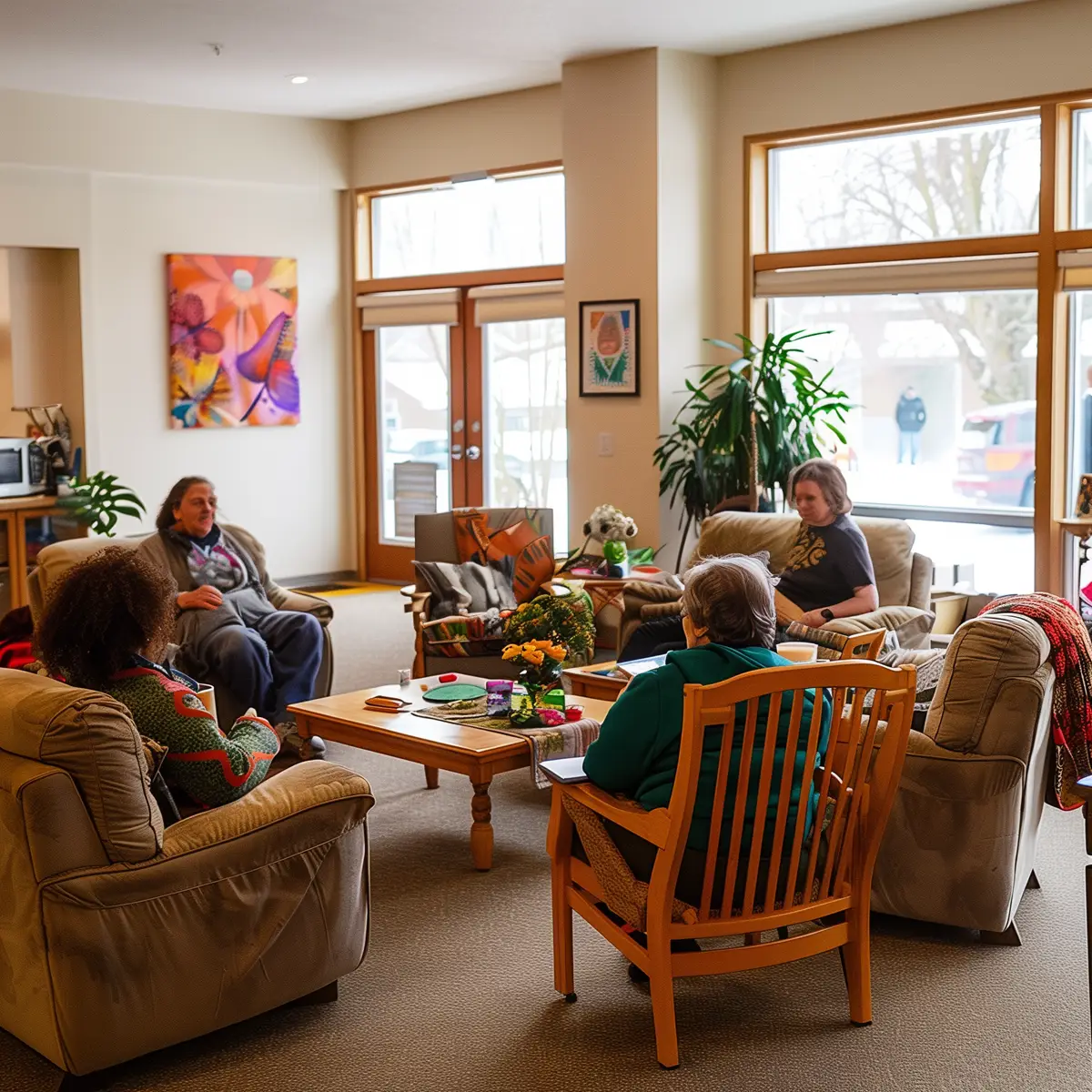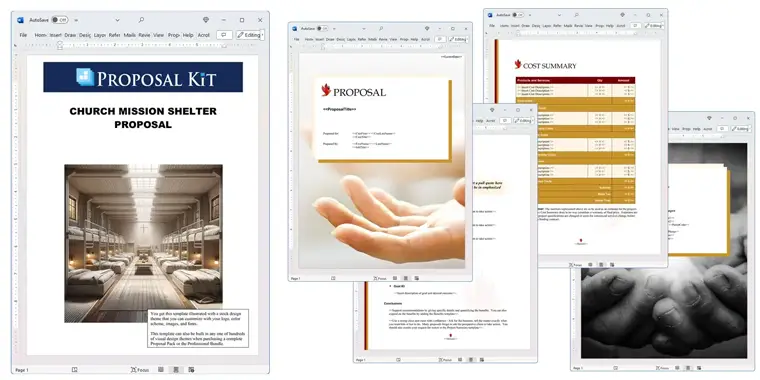How to write your Church Mission Shelter Proposal
We include this 15 page layout with every Proposal Pack. If you want this template to have a different visual design theme than the one illustrated here, purchase any Proposal Pack design and create this template using the purchased design theme. This template is included in every Proposal Pack. If you get a Proposal Pack or the Professional Bundle, you can also make any variation of this template with different chapters to suit your needs.
We typically include more chapters in the templates than most people will need to give everyone more variety in the chapters they may need. You can trim down a long template by removing pages you do not need or combining multiple chapter topics into one page.
 DOWNLOADABLE, ONE-TIME COST, NO SUBSCRIPTION FEES
DOWNLOADABLE, ONE-TIME COST, NO SUBSCRIPTION FEES![]() View Church Mission Shelter Sample Proposal
View Church Mission Shelter Sample Proposal
This sample proposal is based on the same layout as this template and is included in every Proposal Pack. The visual design of the templates will match whichever Proposal Pack design you purchase. To get this template in a different design theme than shown in the sample, purchase any other Proposal Pack design theme and this template will be included.
You can create an editable Word version of this sample in any design theme of your choice including branded to your logo.
 If you need this template on DVD media order from our Amazon shop.
If you need this template on DVD media order from our Amazon shop.
You can also create countless variations of this document to suit your needs using the included library of 2200+ chapters if ordering a Proposal Pack or Pro Bundle.
 What Our Clients Say
What Our Clients SayI started using both Proposal Pack and Proposal Wizard since 2009 when I opened my advertising agency business. These are awesome tools for every business, and they have much better efficiency when used together. The Proposal Wizard integrates seamless with Microsoft Word and Windows. I became very efficient in writing proposals using these two great products. I am recommending them to any business as very valuable digital tools."
Related Article
Related Video
Related Templates
- Homeless Womens Shelter Non-Profit Funding Proposal
- Orphanage Non-Profit Funding Support Proposal
- Group Home for People with Disabilities Proposal
- Grief Counseling Non-Profit Seeking Funding Proposal
- Transitional Housing Project Proposal
- Teen Center Funding Proposal
- Domestic Violence Support Program Funding Proposal
- Halfway House Proposal
- Mens Center Funding Proposal
- Transitional Housing Funding Proposal
- Substance Abuse Program Proposal
- Senior Home Care Proposal
Writing a Winning Church Mission Shelter Proposal with Proposal Kit
In nonprofit work, especially in supporting vulnerable communities, the ability to effectively convey your mission and needs to potential funders is crucial. One such significant endeavor is drafting a church mission shelter proposal to provide food and shelter for homeless families. A proven way to tackle this challenge, especially for those unfamiliar with proposal writing, is through the Proposal Kit software and template library. Writing a proposal is usually done for funding purposes; however, the Proposal Kit can be used to write the proposal for any situation. Writing your proposal will only be one part of your mission project. Other tasks will ensure you know the laws for hosting the homeless by religious organizations in your state.
If you need to draft a proposal for such noble causes, the Proposal Kit is your go-to resource.
Understanding the Proposal Kit System
Proposal Kit simplifies the process of creating a detailed and persuasive proposal. It includes many templates and a comprehensive line item quoting database system. This system lets users quickly assemble cost summaries, quotes, estimates, budgets, and other financial details. By using this tool, even those without any prior experience in proposal writing can write a document that accurately reflects their project's scope and financial needs.
What Types of Projects Are Church Mission Shelter Proposals Written For?
Church mission shelters engage in various projects to support their community. Examples include:
- Building or upgrading emergency shelter facilities
- Providing meals and food distribution services
- Offering job training and employment assistance programs
- Implementing health and wellness services
- Organizing clothing drives and distribution
- Providing educational programs and support for children
- Facilitating addiction recovery programs
- Offering financial literacy and budgeting workshops
- Creating community outreach and volunteer programs
- Developing mental health support services
Chapters this template is built with
Proposal Kit's template library offers tailored solutions for creating a comprehensive church mission shelter proposal.
Each topic is vital in writing a compelling church mission shelter proposal. By expanding on these sections with clarity, detail, and passion, you can effectively communicate the importance of your mission and rally support for your cause.
These chapters, just a handful of the thousands available, enable you to build a proposal that covers all necessary topics, ensuring a thorough presentation of your project.
Introduction: Laying the Groundwork
The Introduction is crucial for making a solid first impression. You present your organization's mission and vision here, setting the tone for the entire proposal. It's about sharing your story and the why behind your initiative-why your shelter exists, who it serves, and the difference it aims to make in the lives of homeless families. This section warms the reader, preparing them for the following detailed information.
Executive Summary: Capturing the Essence
The Executive Summary distills your proposal into a concise overview, highlighting the most essential points and benefits. This section should grab the reader's attention and convince them of the value and urgency of your project. It summarizes the problem, the solution, the funding needed, and the positive change your shelter aims to create. The goal is to motivate the reader to learn more and support your cause.
Short-Term Objectives: Setting Immediate Goals
Short-term Objectives detail the immediate actions and goals your organization plans to achieve. These might include expanding shelter capacity, launching a meal service program, or starting job training workshops within the next year. These objectives should be SMART: specific, Measurable, Achievable, Relevant, and Time-bound, offering a clear roadmap of the steps you'll take to make an immediate impact.
Long-Term Objectives: Envisioning the Future
Long-term Objectives zoom out to paint a picture of your future vision and the sustained impact you aim to achieve. These could involve long-term strategies for reducing homelessness in your community, building permanent supportive housing, or establishing a comprehensive network of services. These objectives show your commitment to making a difference and the vision guiding your efforts.
Housing: Providing Shelter and Safety
The Housing section describes your shelter's facilities and accommodations for homeless families. Detail the capacity, amenities, security measures, and unique accommodations for families, children, or individuals with specific needs. This section underscores the tangible aspects of your support and the safe, welcoming environment you provide.
Community: Building Support and Engagement
Community discusses how your shelter interacts with and supports the broader community. Highlight partnerships with local businesses, government agencies, and other nonprofits. Describe community engagement efforts, volunteer programs, and how the community can contribute to your mission. This section illustrates the collaborative effort involved in addressing homelessness.
Capacity: Demonstrating Your Ability
Capacity is about showcasing your organization's ability to deliver its promises successfully. Detail your staff's expertise, volunteer support, operational capabilities, and resource management. Highlight past successes and how they position you to tackle current and future challenges. You reassure donors of your competency and reliability.
About Us: Sharing Your Story
About Us provides background information on your organization, including its history, key personnel, and milestones. Share stories of impact and testimonials to humanize your mission and connect with the reader. This section builds credibility and trust, showing your dedication and experience serving the homeless community.
Donations: Clarifying Needs and Usage
Donations outline the specific financial needs of your project and how the mission will use contributions. Be transparent about housing, food services, programs, and maintenance costs. Explain the impact of each donation level, showing potential donors exactly how their support will make a difference. This clarity encourages more targeted and meaningful contributions.
Mission Statement: Defining Your Purpose
The Mission Statement articulates your organization's core purpose and goals. It's a succinct declaration of what you stand for and the change you seek to make. This statement should inspire, guide your actions and decisions, and resonate with supporters and the community.
Core Values: Guiding Your Work
Core Values highlight the principles that underpin your organization's work. These include compassion, respect, dignity, community, and innovation. These values inform how you approach your mission, treat those you serve, and interact with partners and supporters. They're the ethical compass that guides every aspect of your operations.
Frequently Asked Questions: Addressing Inquiries
The Frequently Asked Questions section anticipates and answers common queries about your proposal and project. These could range from how donations are used to volunteer opportunities, success stories, and the process for homeless families to access your services. You build trust and transparency with your audience by proactively addressing these questions.
Use cases for this template
Jasmine's Victory with Hopeful Horizons Outreach
Jasmine's journey with Hopeful Horizons Outreach illustrates the transformative power of a well-written proposal. Facing the need to expand their shelter to accommodate more homeless families, Jasmine turned to Proposal Kit for guidance. The comprehensive templates and easy-to-navigate software allowed her to articulate the outreach program's urgent needs and the strategic plan for utilizing financial support. Her proposal detailed the projected impact of the expansion, including increased housing capacity, enhanced support services, and improved community outreach programs. The proposal's clarity and professionalism resonated deeply with potential funders, successfully securing the necessary funds. Jasmine's story is a testament to how effectively communicating your mission and needs can rally support and bring about meaningful change.
Leo's Timely Triumph at Community Compass Services
Under pressure to meet a looming deadline, Leo was in a race against time. The challenge was not just to submit any proposal but to submit one that would capture the innovative spirit of Community Compass Services and its fresh approach to tackling homelessness. Leveraging Proposal Kit's structured templates alongside AI writing tools, Leo was able to streamline the proposal writing process. He infused the document with insights and data-driven solutions, compellingly showing how the new homeless shelter initiative would address critical gaps in services and support. The result was a persuasive, well-organized proposal submitted on time. Leo's success highlights the synergy between Proposal Kit's organizational tools and AI's creative potential, demonstrating that writing quality and innovation can be maintained even under tight deadlines.
Maya's Global Influence with Global Shelter Initiatives
As a volunteer passionate about making a difference on a global scale, Maya faced the daunting task of creating an RFP that would garner international attention. The goal was to find service providers capable of meeting the diverse needs of church mission shelters worldwide. With Proposal Kit, Maya wrote a clear and comprehensive RFP outlining the specific services required, from construction and renovation to program development and support services. The detailed documentation and professional presentation ensured the RFP stood out, attracting high-quality responses from providers eager to collaborate on such vital projects. Maya's story underscores the importance of clarity and detail in creating RFPs that speak directly to the project's needs while inviting collaboration and innovation from around the globe.
Conclusions and Recommendations
The stories of Jasmine, Leo, and Maya reflect the diverse yet equally impactful ways Proposal Kit can facilitate the creation of proposals and RFPs that drive change. Whether expanding a local shelter, launching a new initiative under tight deadlines, or seeking global partners for mission shelters, Proposal Kit provides the tools and structure needed to convey your message powerfully. These success stories exemplify how individuals and organizations can leverage Proposal Kit to turn their visions into actionable plans, securing the support and resources needed to impact the communities they serve significantly.
Writing a church mission shelter proposal can be a streamlined, efficient process with a Proposal Kit. It not only aids in securing the necessary funding and support but also helps bring your project to life, making a tangible difference in the lives of those you aim to serve. If you're tasked with this vital work, remember that a comprehensive, well-constructed proposal is within your reach with a Proposal Kit, ensuring your church mission shelter proposal stands a strong chance for success.
Also Known As
This template may also be referred to in different ways or be used in more specialized situations, such as:
- Faith-Based Outreach Housing Initiative
- Church-led Community Support and Housing Plan
- Spiritual Welfare Accommodation Project
- Congregational Homelessness Relief Proposal
- Divine Shelter Program
- Sanctuary Housing Scheme
- Parish Shelter Outreach Proposal
- Ecclesiastical Mission for Community Shelter
- Holy Haven Project Plan
- Sacred Shelter Development Proposal
Abstract
 The rising need for affordable housing and support for the working poor has prompted local governments and city councils to explore innovative solutions. A church mission shelter proposal offers a beacon of hope for families waiting on the streets, responding to the urgent necessity for emergency rooms and safe houses. Using tools like Proposal Kit, these proposals aim to secure funding and support from the larger community. By working with the police department and other local entities, the shelter seeks to create a facility where citizens can find rest and begin rebuilding their lives. This initiative not only addresses immediate needs but also paves the way for sustainable growth and community connections.
The rising need for affordable housing and support for the working poor has prompted local governments and city councils to explore innovative solutions. A church mission shelter proposal offers a beacon of hope for families waiting on the streets, responding to the urgent necessity for emergency rooms and safe houses. Using tools like Proposal Kit, these proposals aim to secure funding and support from the larger community. By working with the police department and other local entities, the shelter seeks to create a facility where citizens can find rest and begin rebuilding their lives. This initiative not only addresses immediate needs but also paves the way for sustainable growth and community connections.
The church mission shelter proposal emphasizes the importance of collaboration with the city council and neighborhood groups, realizing that a sense of community is crucial for long-term success. The proposal outlines the transformation of a vacant property into a thriving center for support, where bunk beds and warm meals replace the cold streets. By engaging the larger community through a social media group and public forums, the proposal invites comments and deals with potential opponents by highlighting the positive impact on schools and neighborhoods.
With winter approaching, the need for such shelters becomes more pressing. The proposal's committee hopes to see it approved with the ultimate goal of creating a sanctuary where the homeless can find solace. Through partnerships with the police department and local businesses, they aim to provide more than just shelter; they offer programs for addiction recovery, financial literacy, and employment assistance. This holistic approach not only addresses immediate needs but also fosters personal growth and stability, reducing the dependency on emergency services and paving the way for a safer, more compassionate town.
 Ultimately, the church mission shelter proposal is more than an idea; it is a call to action, urging citizens to respond to the crisis of affordable housing and homelessness. Securing the necessary funds and engaging with the community sets the foundation for a brighter future, turning despair into hope and transforming lives in the process. Through planning and communal effort, the proposal aims to fill the gaps in services, ensuring that no person is left waiting on the streets and every family finds a place they can call home.
Ultimately, the church mission shelter proposal is more than an idea; it is a call to action, urging citizens to respond to the crisis of affordable housing and homelessness. Securing the necessary funds and engaging with the community sets the foundation for a brighter future, turning despair into hope and transforming lives in the process. Through planning and communal effort, the proposal aims to fill the gaps in services, ensuring that no person is left waiting on the streets and every family finds a place they can call home.
The church mission shelter proposal focuses on addressing the pressing issue of affordable housing in the city and its neighboring towns. By collaborating with local governments and engaging the city council, the proposal aims to transform unused land into a vibrant sanctuary for the working poor and families on the edge of homelessness. The proposal is a community-centric initiative that seeks to harness the power of the larger community to create a facility filled with hope and opportunities for those who have spent too many nights on the streets.
To implement this idea, the proposal emphasizes the importance of building strong connections with the city and county. By working closely with the police department, fire services, and social welfare organizations, the shelter will provide a secure environment where individuals can find rest and begin rebuilding their lives. This site aims to become a beacon of hope for those who realize their situation requires immediate assistance, offering a comprehensive array of services ranging from addiction recovery programs to educational workshops designed to empower citizens.
 The facility's plans include an array of services targeting the unique needs of the community. From addiction recovery programs for those struggling with alcohol and drugs to mental health support and job training workshops, the proposal outlines a path to comprehensive growth and rehabilitation. This holistic approach not only addresses the immediate challenges of homelessness but also instills a sense of dignity and purpose in the lives of those it seeks to assist.
The facility's plans include an array of services targeting the unique needs of the community. From addiction recovery programs for those struggling with alcohol and drugs to mental health support and job training workshops, the proposal outlines a path to comprehensive growth and rehabilitation. This holistic approach not only addresses the immediate challenges of homelessness but also instills a sense of dignity and purpose in the lives of those it seeks to assist.
Recognizing potential opponents, the proposal committee has decided to explore ways to engage community members and address their concerns. By organizing public meetings and using platforms like a social media group, they aim to create an open dialogue that fosters understanding and support. This proactive approach ensures that the project is a collaborative effort, with input from all stakeholders contributing to its success.
Financial considerations are an important part of the proposal. It outlines a detailed budget and funding plan that includes grants, donations, and partnerships with local businesses. The proposal clearly discusses how the money will be spent, from constructing the facility to operational costs such as staffing and program supplies. This transparency builds trust with potential funders, showing that each dollar will be used to make a tangible impact.
 As the committee awaits the city council's decision, there is a growing sense of anticipation and optimism. With the deadline for approval looming, the proposal represents a timely and necessary response to the community's needs. It is not just a plan for a shelter; it is an answer to a citywide call for action, an opportunity to transform vacant land into a vibrant center of hope and change where families can find the support they need to rebuild their lives.
As the committee awaits the city council's decision, there is a growing sense of anticipation and optimism. With the deadline for approval looming, the proposal represents a timely and necessary response to the community's needs. It is not just a plan for a shelter; it is an answer to a citywide call for action, an opportunity to transform vacant land into a vibrant center of hope and change where families can find the support they need to rebuild their lives.
Frequently Asked Questions
What should be included in a church mission shelter proposal?
A comprehensive church mission shelter proposal should include an introduction that outlines the project's purpose and vision, a needs assessment that demonstrates the shelter's necessity, a detailed plan of action specifying the services to be provided, a budget and funding strategy, a timeline for implementation, and a section on how success will be measured. It should also feature information about the team involved, potential partnerships, and legal or regulatory considerations.
How do we determine the needs of our community?
To accurately determine your community's needs, conduct thorough research, including surveys, interviews, and focus groups with local residents, community organizations, and service providers. Use existing data from government reports, non-profits, and other relevant sources to understand the homelessness issue in your area comprehensively. This data will help justify the need for the shelter and tailor the services to meet the community's needs.
What is the best way to present our budget and funding plan?
Present your budget clearly and in detail, breaking it into categories such as construction costs, operational expenses, staffing, and program supplies. Include both startup and ongoing fees. Following the budget, outline your funding strategy, identifying potential funding sources such as grants, donations, fundraising events, and partnerships with other organizations. It's essential to show that your financial plan is sustainable and has contingency plans.
How do we address potential challenges or objections in our proposal?
Anticipate and address potential challenges or objections by including a risk assessment section identifying possible obstacles such as zoning issues, funding shortfalls, or community opposition. Offer clear, practical solutions and show how similar shelters have overcome these challenges. Engage with community members early in the planning process to build support and address concerns, demonstrating that you have considered their input and are committed to working collaboratively.
How do we demonstrate the impact and success of the shelter?
To demonstrate the impact and success of your shelter, outline clear, measurable goals and objectives in your proposal. Specify the metrics you will use to track progress, such as the number of individuals served, the length of stay, and the outcomes achieved (e.g., employment, stable housing). Include a plan for regular reporting and evaluation, and describe how you will continually use this data to improve the program. Showcasing stories of individuals who have benefited from similar programs can also be a powerful way to illustrate potential impact.
15% Off Discount
![]() Add To Cart This Word Template Only
Add To Cart This Word Template Only
 Add To Cart Proposal Pack Spiritual #4
Add To Cart Proposal Pack Spiritual #4
 Add To Cart Proposal Kit Professional Bundle
Add To Cart Proposal Kit Professional Bundle
 4.7 stars, based on 846 reviews
4.7 stars, based on 846 reviewsProposal Kit chapters used in this template
Cover Letter, Title Page, Table of Contents, Introduction, Short Term Objectives, Long Term Objectives, Housing, Capacity, Community, Donations, Mission Statement, Core Values, About Us, Frequently Asked Questions, Back Page
You use this proposal for
- General business proposal
- Non-technical proposal
- Project pitch proposal
- Non-government grant, non-profit, NGO proposal
- Spiritual, church, community proposal
How to create this template with Proposal Pack Wizard
You can create this document using any of the logo-designed Proposal Packs. Pick any Proposal Pack with a logo design theme you like best; they will all work equally well. The Proposal Pack for Any Business is the pack with no extra added logos or colors - designed to be used plain or for you to customize with your logos and graphics.
The Proposal Pack design theme you purchase will determine the visual look of this template. The screenshot above only shows the plain generic design theme. Names and stories in examples are fictional; however, the templates are from real client use cases.
We include a library of chapters to be assembled based on your needs. All proposals are different and have different needs and goals. We designed Proposal Pack so you can customize the documents to suit your needs.
You will best create this document using the Proposal Pack Wizard - Expert Edition software to select this template and build it in the Proposal Pack logo design theme of your choice along with any desired customizations (such as adding additional chapters, removing unneeded chapters, changing the order of chapters, and importing your company logo). This template outlines a proposal for the described situation. Each user is responsible for typing in the actual content of the provided pages with their information to complete the proposal. Suggestions in the abstract may include features in higher-end packages and are facilitated by the selection of chapter templates to support the narrative of each proposal, which help guide the user in filling in the details.
You create this template using the Wizard software with an entire Proposal Pack library and software. We include the Expert Edition of the software in the Proposal Kit Professional bundle. Microsoft Word for Windows is required to use the customizing software. You can also edit Word document templates in other office software such as Word for Mac. We will assist Mac users in assembling complex templates for their first project if they do not have the required platform to run the Wizard software.
You only get the single assembled Word document if purchased as a stand-alone template. The individual template products include no other templates, samples, or software.
How to Build Templates Featured on Proposal Kit Website
Many people find the Proposal Kit website after searching for a specific proposal. Once you've purchased and installed the software, how do you build that template you found in the first place? This video shows you how to build any proposal you see on the Proposal Kit website.
Key Takeaways
- The Church Mission Shelter Proposal is available as a ready-to-edit template.
- You can create unlimited custom variations of this template using a Proposal Pack or the Professional Bundle.
- Using a Proposal Pack or Professional Bundle, you can automate quotes and other financial pages with a line-item database.
- There are no ongoing subscription fees. You get lifetime unlimited use.
- We made Proposal Kit for freelancers, small businesses, and non-profits.
- Proposal Kit product content (templates, samples, software) is 100% written by humans.
 Ian Lauder has been helping businesses write their proposals and contracts for two decades. Ian is the owner and founder of Proposal Kit, one of the original sources of business proposal and contract software products started in 1997.
Ian Lauder has been helping businesses write their proposals and contracts for two decades. Ian is the owner and founder of Proposal Kit, one of the original sources of business proposal and contract software products started in 1997.By Ian Lauder
 Published by Proposal Kit, Inc.
Published by Proposal Kit, Inc.


 Cart
Cart


 Get 15% off ordering today:
Get 15% off ordering today: 

 Facebook
Facebook YouTube
YouTube X
X Search Site
Search Site